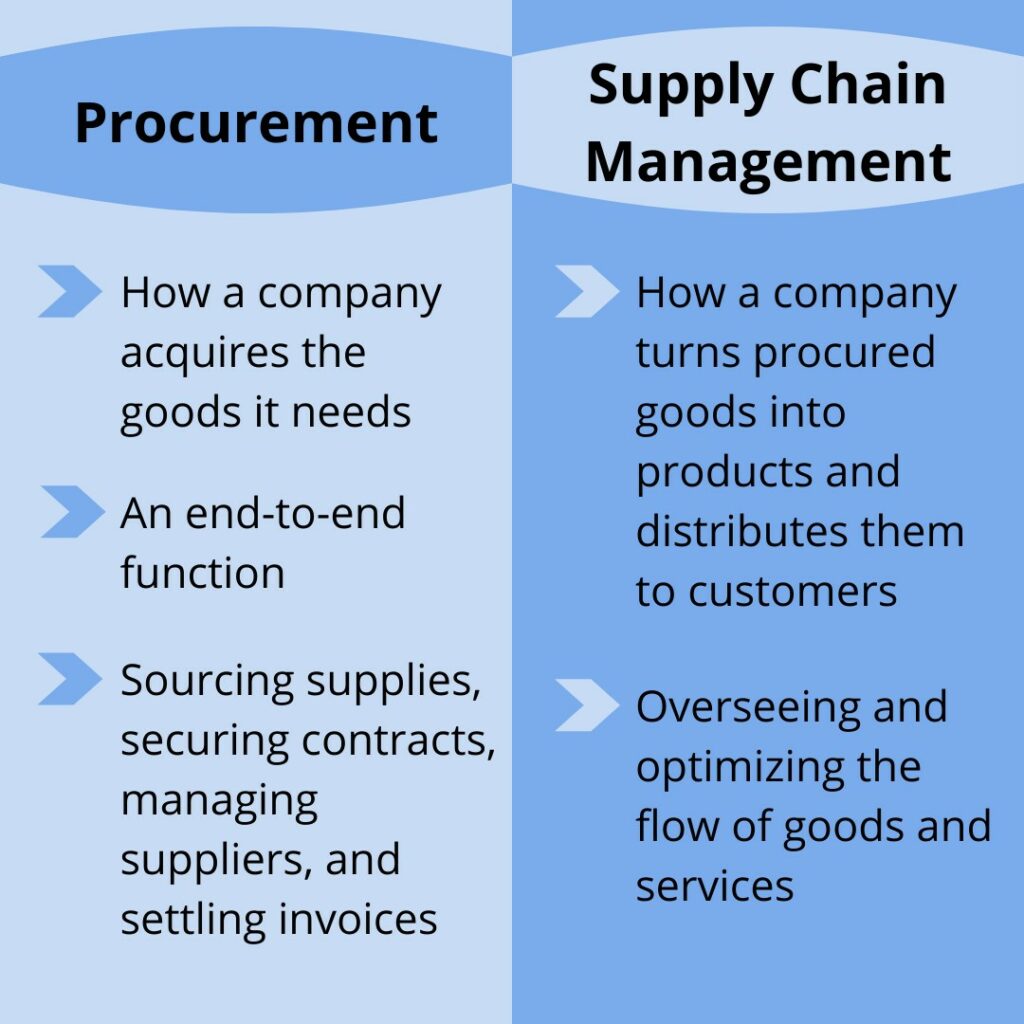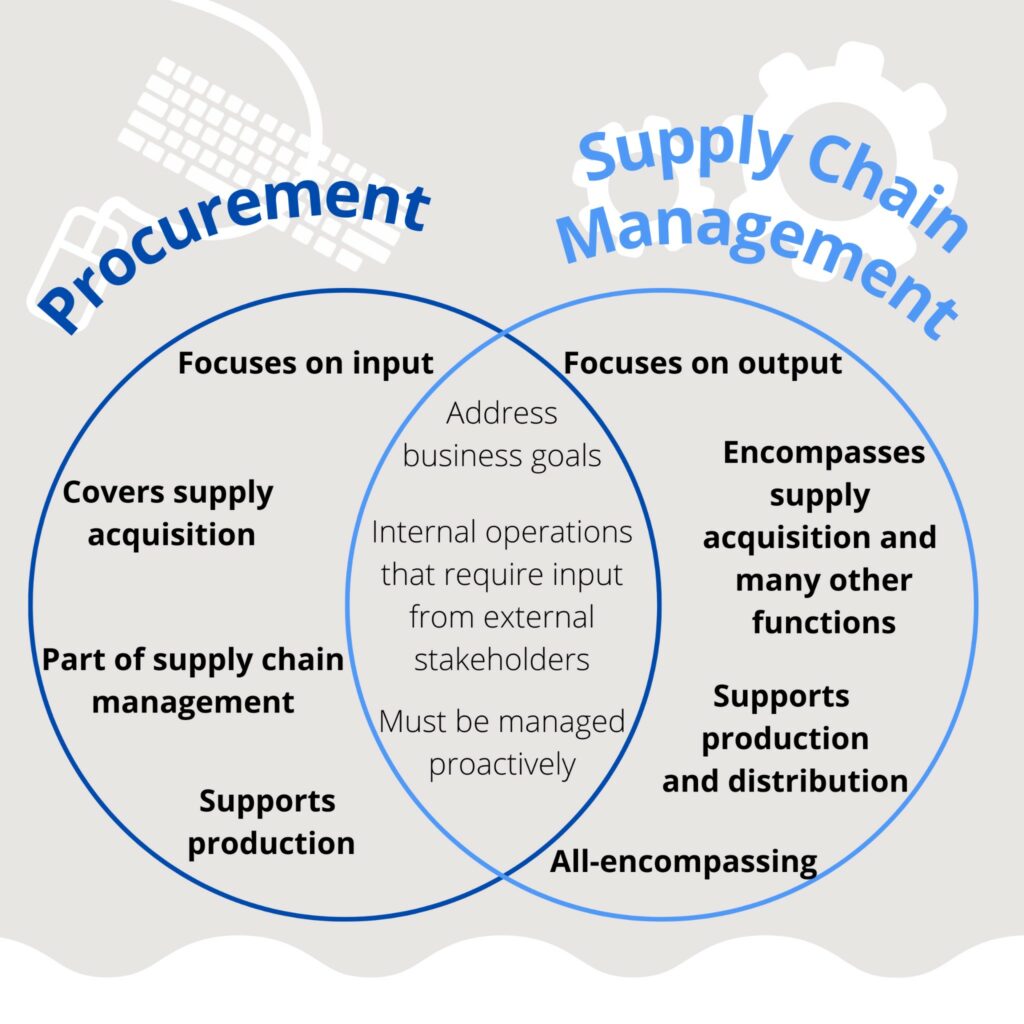Many people discuss procurement and supply chain management as if they were the same thing, but there are several important distinctions between Procurement Vs Supply Chain Management. It is mandatory to know the differences, especially if you’re going through the telecom or IT procurement process yourself.
Keep reading to discover:
If the procurement process has you feeling stressed or overwhelmed, turn to Technology Procurement Group. With us, you’ll get a winning procurement strategy that drives business objectives and cost savings. Just fill out the form at the bottom of the page, reach out by phone at 1-888-449-1580, or email at info@TPG-llc.com to get in touch.
The Concepts of Procurement and Supply Chain Management
Although many people use the terms “procurement” and “supply chain management” interchangeably, these are two separate concepts. They often get mixed up, so it’s important to know the differences between them.

Put simply, procurement is the process by which a company acquires the goods it needs for a business model. Meanwhile, supply chain management is how a company turns the aforementioned goods into products and distributes them to customers.
Procurement
The procurement process covers all of the efforts that play a part in discovering and acquiring the supplies a business needs to function. Steps in the procurement process include sourcing supplies, securing contracts, managing suppliers, and settling invoices.
Procurement isn’t just purchasing supplies; it’s more of an end-to-end function. It begins when a business identifies the need for supplies (such as telecom services, for example). It ends once the business has possession of the needed supplies or when infrastructure is in place to deliver those supplies.

Companies utilize both direct and indirect procurement. Direct procurement refers to expenditure on goods and services that directly impact the organization’s bottom line. Indirect procurement, however, involves spending on day-to-day operations and various other requirements that don’t directly impact the company’s profit. Telecommunications procurement is a form of indirect procurement. There are telecom procurement strategy consulting services to reduce costs and make long time relationships with vendors.
Supply Chain Management
The primary goal of supply chain management is to optimize the supply chain to run as smoothly as possible. Procurement is one component of the supply chain management process, but there are many other tasks involved as well.
Before getting into the details of supply chain management, let’s cover what a supply chain is. In short, the supply chain is the network of suppliers, manufacturers, logistics providers, and others who collaborate to get a business’s product into clients’ hands.
Depending on the goods and services a company sells, its supply chain will vary from that of other businesses. A supply chain might be composed of gatherers of raw materials, vendors, warehouse workers, producers, manufacturers, retailers, transportation companies, in-house staff, stockroom staff, and even cashiers. Essentially, everyone who plays a role in getting products to clients is part of the supply chain.

Supply chains can also comprise various functions and tasks that contribute to moving products, like customer service, finance, distribution, market research, and procurement. Additional responsibilities within the supply chain include sourcing, marketing, and quality assurance.
Overall, supply chain management involves overseeing the supply chain to improve the flow of goods and services, as well as the transformation from raw materials into products. It’s the art of managing all relevant factors to efficiently move products into customers’ hands.
Similarities and Differences Between Procurement vs. Supply Chain Management
To recap, procurement is the process of acquiring supplies needed to run business operations, while supply chain management covers transforming those supplies into products and delivering them to end-users.

What They Have In Common
Procurement and supply chain management both play a role in addressing business goals and targets. They’re both internal operations that may require input from external stakeholders; still, the core of procurement and supply chain management lies within the organization itself.
For procurement and supply chain management to support business operations, each must be managed proactively.
Where They Differ
One of the most significant differences is that procurement focuses on input, while supply chain management focuses on output. Procurement covers the acquisition of supplies, while supply chain management encompasses supply acquisition and much more.
Business professionals can view procurement as a microcosm within the wider macrocosm of supply chain management. Procurement supports production, and supply chain management supports both production and distribution.
Supply chain management is the main function supported by procurement. It’s all-encompassing, whereas procurement exists to support supply chain management with the supplies it needs to function properly.
Experience a Streamlined Procurement Process with TPG

Procuring data network or voice services doesn’t have to be a daunting task. Work with Technology Procurement Group and experience a smoother, more streamlined procurement process. We’ll put our expertise to work to ensure you find the best supplier to fit your needs while also achieving your business objectives and maximizing cost savings.
Interested in working together, or want to get more information? Call us at 1-888-449-1580, email us at info@TPG-llc.com, or fill out the form at the bottom of the page. We look forward to making your procurement process easier than ever before!




